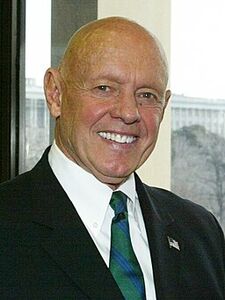The 7 Habits of Highly Effective People by Stephen Covey
Stephen Covey (1932-2012) was the author of the best-selling The 7 Habits of Highly Effective People and other management and business titles. He earned an MBA at Harvard.
The article Covey’s 7 Habits of Highly Effective People: An Ethics Perspective indicates:
| “ | The 7 Habits presents an “inside-out” approach to human effectiveness that is centered on principles and character. Inside-out means that change starts within oneself. Covey contends that many people who have achieved a high degree of outward success still find themselves struggling with the inner need to develop personal effectiveness and growing healthy relationships with other people.
Covey contends that the success literature of the last half of the 20th century largely attributed success to a philosophy of the Personality Ethic: personality traits, skills, techniques, and maintaining a positive attitude. He believes we need to return to the Character Ethic that preceded it and emphasized deeper principles to guide long-term relationships. Covey refers to a Character Ethic, meaning to align one’s values with “universal and timeless” principles such as fairness, integrity, honesty and truthfulness, and treating people with respect. His principles are deep fundamental truths that have universal application. They apply in any situation, in any culture, and are found in the world’s major religions. Thus, they have components of the ethical values that form the basis of the Golden Rule. The habits discussed below are those that deal most directly with ethical behavior.[1] |
” |
The 7 Habits of Highly Effective People are:[2]
1. Be Proactive. Proactive as defined by Stephen Covey means that you don't just let life happen to you, and don't respond "by instinct" like a dog.[3]
2. Begin With the End in Mind. See: Problem solving and Planning
3. Put First Things First. See: Prioritization
4. Think Win-Win. See: Interpersonal skills and Negotiation
5. Seek First to Understand, Then to Be Understood. See: Empathy
6. Synergize (Creative cooperation. Working with another/others to create something greater than you could do alone)[4] See: Collaboration skills
7. Sharpen the Saw (Sharpen your skills). See: Self-efficacy and Skills
| The 7 Habits of Successful People | |
|---|---|
| Habit 1 - Be proactive | Private Victory |
| Habit 2 - Begin with the end in mind | |
| Habit 3 - Put first things first | |
| Habit 4 - Think win-win | Public Victory |
| Habit 5 - Seek first to understand, then to be understood | |
| Habit 6 - Synergize | |
| Habit 7 - Sharpen the saw | Renewal |
See also
Other achievement related books:
- The Achievement Factors: Candid Interviews With Some of the Most Successful People of Our Time
- Peak Performance Principles For High Achievers by John R. Noe
- The Magic of Thinking Big by David Swartz
- The Magic of Thinking Big by David Swartz
- The Achieving Society
External links
- 7 Habits of Highly Effective People [Summary & Takeaways]
- The 7 Habits of Highly Effective People by Stephen R. Covey - Book summary
Video:
Notes
- ↑ Covey’s 7 Habits of Highly Effective People: An Ethics Perspective
- ↑ The 7 Habits of Highly Effective People
- ↑ Broadly what is meant by that is to focus our efforts and attention on the long-term and to think in terms of the long-term consequences of our actions. 7 Habits of Highly Effective People by Stephen Covey
- ↑ Habit 6: Synergize
